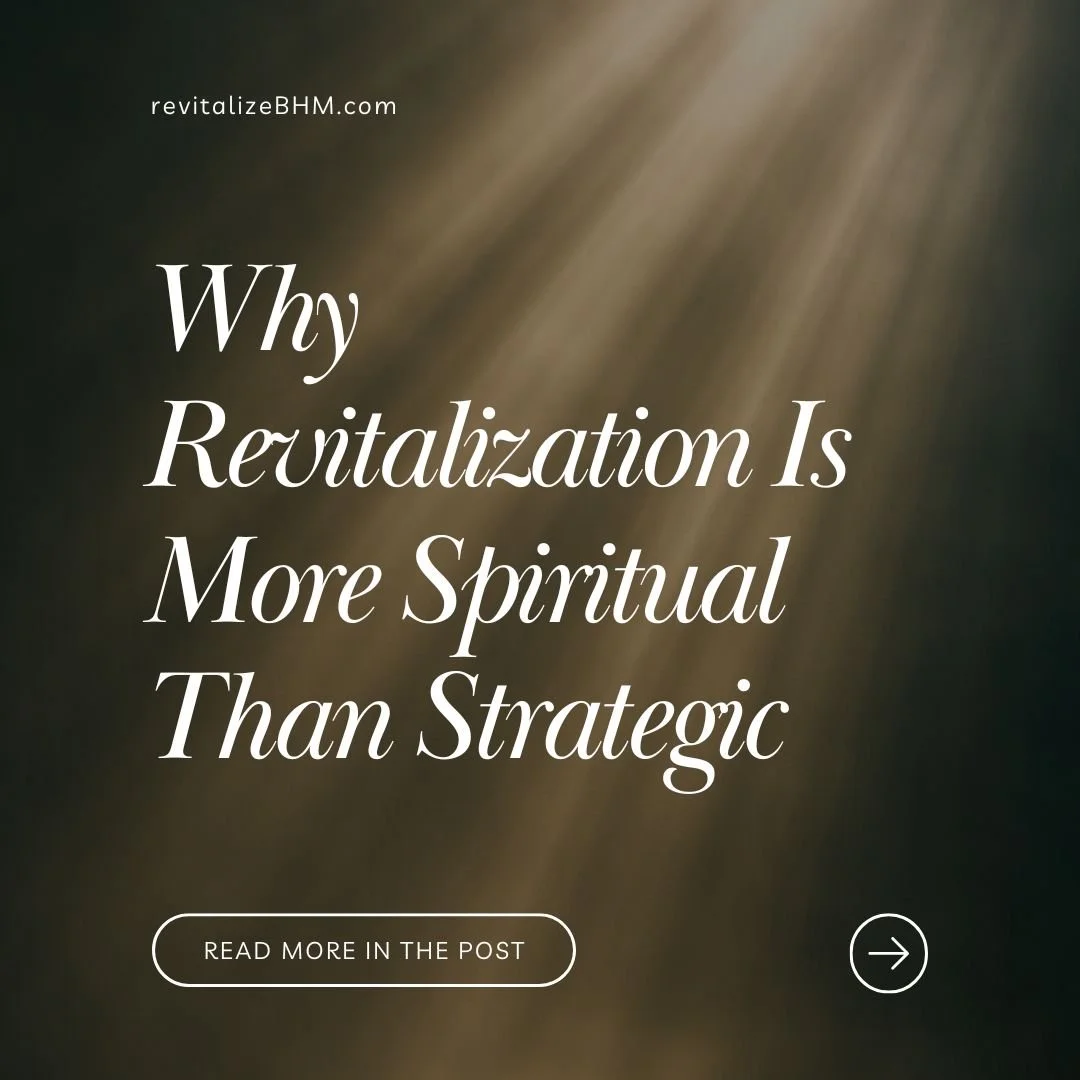When Churches Choose Memories Over Mission
Churches in transition often choose pastors based on the golden age of their past rather than the realities of their next season. The church chooses someone who fits its memories instead of its mission, which fuels nostalgia, inward focus, and reversion. Strategic Interim leadership helps churches understand their current reality, their community, and the kind of leadership the next season actually requires.
When Churches Want Hospice but Need Physical Therapy
Many declining churches say they want revitalization, but the leaders they choose reveal a deeper desire for comfort. Hospice leadership soothes symptoms while decline continues. Churches that still have life need physical-therapy leadership that restores strength through honest assessment, necessary discomfort, and sustained change.
Why Leadership Health Shapes Church Health More Than Vision
Churches do not outgrow the health of their leaders. Tired, anxious, or depleted leadership eventually shapes church culture, no matter how clear the vision is. Revitalization becomes sustainable when leaders steward their own health with the same seriousness they give to strategy.
When Leadership Clarity Feels Like Isolation
Leaders often carry clarity long before others are ready to move. That gap can feel isolating and frustrating, but it usually reflects different processing timelines, not resistance. Wise leadership paces change, walks with people, and turns clarity into shared conviction rather than forced compliance.
How Pastors Drift from Rest Without Ever Choosing It
Pastoral exhaustion usually comes from slow drift, not deliberate neglect. As urgency replaces rest, fatigue becomes normalized. Reclaiming Sabbath requires honesty, boundaries, and a commitment to lead at the pace of Jesus rather than the pressure of ministry demands.
If You Want to Reach the Dechurched, Start by Listening, Not Inviting
In the Bible Belt, many people attended church out of habit rather than deep discipleship. When COVID removed social pressure, they quietly disconnected. Reaching the dechurched now requires listening, honesty about past failures, and rebuilding trust through presence rather than pressure.
Why Revitalization Is More Spiritual Than Strategic
Strategy supports revitalization, but it cannot replace spiritual work. Lasting renewal grows from prayer, repentance, humility, and formation. Churches are revitalized from the inside out, not by plans alone.
The Difference Between a Willing Church and a Ready Church
A willing church agrees change is needed. A ready church has accepted the cost of that change. Revitalization stalls when leaders confuse the two. Discernment, patience, and formation help churches move from willingness to readiness.
Ten Measures That Matter More Than Attendance
Healthy churches measure more than attendance. Engagement, discipleship, leadership development, prayer, generosity, and community presence reveal true health. January is the ideal time to reset what churches measure and why.
January Is the Time to Look in the Mirror
Just as individuals reflect in January, churches should pause to assess reality. Reviewing trends, listening to people, studying the community, and examining spiritual health creates clarity. Honest evaluation is the necessary starting point for faithful planning.
Ten New Year’s Resolutions for Pastors
Healthy pastoral leadership begins with spiritual grounding, wise pacing, and shared responsibility. These ten resolutions encourage pastors to lead with humility, protect their spiritual health, and trust God with the work ahead.
Ten New Year’s Resolutions for Churches Seeking Revival
Revival begins with obedience, not programming. These ten resolutions help churches align priorities around prayer, unity, discipleship, simplicity, and community engagement as they seek renewal in the new year.
Do Not Miss Christmas by Trying to Make It Impressive
The first Christmas was quiet, humble, and ordinary, yet it changed the world. Churches today risk missing the heart of the season by chasing impressiveness instead of faithfulness. Simplifying Christmas ministry can create more space for Christ, community, and rest.
Ten Creative Ways to Use Your Church Building for Ministry All Week
Church buildings are often underused while communities around them have real needs. From hosting nonprofits and co-located churches to childcare, schools, recovery groups, and community programs, churches can use their facilities for meaningful ministry all week long.
Shared Space Is Not Failure. It Is Stewardship.
Church buildings are often underused while surrounding communities change and grow. Sharing space with other churches or ministries is not a sign of decline but faithful stewardship. When churches with distinct cultures partner in the same space, they expand mission, reach people they could not reach alone, and model unity in the body of Christ.
The Ministry Myths That Keep Dying Churches From Moving Forward
Churches often cling to myths like “we just need young families” or “a new pastor will fix everything.” These beliefs derail revitalization because they shift focus away from true spiritual and cultural issues. Naming these myths is the first step toward health.
Why Revitalization Takes Longer Than You Think
Revitalization feels slow because culture changes slowly and discipleship grows at real-life speed. God shapes the pastor and the church through seasons of waiting, resistance, and small steps. Slow movement is not failure. It is the normal pace of lasting renewal.
Stop Assuming People Know the Mission. Say It Again.
Most church members forget the mission quickly unless leaders repeat it with clarity and conviction. Vision leaks. New people need direction. And a drifting church needs the mission woven into sermons, meetings, and conversations. Healthy churches repeat the mission until it becomes part of the culture.
The Silent Killers of Church Revitalization
Most revitalization efforts are not destroyed by loud conflict. They are quietly suffocated by resentment, fear, passive leadership, disengaged volunteers, and a lack of honest evaluation. Addressing these silent killers is the first step toward a healthier, united church.
Ten Things Revitalization Leaders Can Be Thankful For
Revitalization can feel exhausting, but God is still at work. This article highlights ten things pastors and revitalization leaders can be thankful for, from small wins to returning guests to renewed prayer. Gratitude gives perspective and reminds leaders that God is carrying the church forward.





















